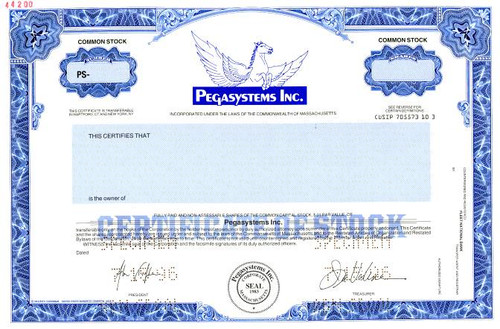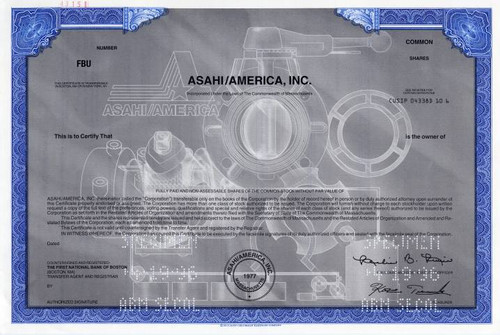Beautifully engraved RARE specimen stock certificate from Net.B@nk, Inc. incorporated in 1996. This historic document was printed by the Security-Columbian Banknote Company. This item has the printed signatures of the Company's Vice Chairman and Chief Executive Officer, and Secretary. NetBank, formerly named Atlanta Internet Bank (1996) and Net.B@nk (1998), was a financial company engaged primarily in retail banking, mortgage banking, business finance and providing ATM and merchant processing services. NetBank was founded in February 1996 and completed its initial public offering of stock in July 1997. It was one of the pioneers of the Internet banking industry, and recognized as one of the first internet-only banks. Netbank was closed on September 28, 2007, by the Office of Thrift Supervision (OTS) in conjunction with the Federal Deposit Insurance Corporation (FDIC). FDIC insured deposits were acquired by another virtual bank, ING Direct. Several shareholders have filed class action lawsuits against Netbank claiming misrepresentation of the company value during the restructuring period. NetBank was founded in 1996 as one of the nation's first Internet-only banks. Using a new business model, NetBank paid higher interest rates for computer-savvy customers in exchange for not having physical bank branches. This model made sense and the bank early on paid very nice interest rates. NetBank made its money from a mortgage and lending operation. The majority of home loans were offered through traditional channels and a small percentage of loans were offered through the same internet channels as the banking offerings. NetBank obtained customers by offering some sort of "sign on" bonus. A $50 bonus was a common bonus. NetBank signed many agreements with other companies to promote itself and the companies would offer gift certificate or credit to their loyalty programs (i.e., frequent flyer programs) equivalent to around $50. These customer acquisition programs proved beneficial and NetBank gained many customers in this manner. Starting in the early 2000s, NetBank acquired a number of financial-related companies to diversify and improve the bottom line. In 2000, Netbank added the following products and services: Online safe deposit boxes for safe storage of electronic records, individual retirement accounts, and expanded customer support (online chat and 24x7 availability). In 2001, Netbank acquired Resource Bancshares Mortgage Group, a leading provider of mortgage banking services. An online currency program was launched. And, NetBank acquired Market Street Mortgage, a leading provider of home mortgage to American consumers. The same year also brought a change in management to NetBank. A new CEO, Douglas K. Freeman, was appointed to head and manage the company. Freeman came from RBMG and had a background in mortgages rather than banking. In 2003, NetBank added a number of business and product lines: NetBank expanded into automobiles by offering auto insurance through sister company NetInsurance and direct consumer auto loans through Florida auto dealerships. NetBank also acquired what became NetBank Payment Systems, a provider of off-premise ATM and merchant processing services. A number of ATMs were acquired in this acquisition. Finally, NetBank also launched a small business banking program. In 2004, NetBank continued adding new product lines and acquired additional companies. NetBank acquired the assets of Beacon Credit Services, a leading provider of RV, boat and aircraft financing. They added business credit cards, internet payroll services, prepaid Visa gift cards, and expanded financial planning services. In response to customer concerns about mailing in deposits, NetBank launched Financial Technologies Inc (FTI) whose primary product was QuickPost, where deposits are shipped overnight from UPS stores to NetBank for processing. NetBank reached the peak of the operation at the end of 2004 and through 2005. The rapid expansion into multiple lines of businesses may have proved to be too much, too soon for NetBank and it started to lose money in 2005. In 2005, NetBank suffered some setbacks due to the cyclical nature of the mortgage industry and did not add any businesses or products to their line, instead choosing to preserve capital until the mortgage curve righted itself and they could resume earning profit from the mortgage businesses. They also introduced a tiered deposit system, where they paid the highest interest rates to people who also were customers of their other products (home or auto loan, savings account, or CD) and the lowest interest rate to people that only had a savings or checking account. The intent was to better cross-sell the products and help transition the banking customers to the other platforms. Many customers were turned off by the tiered system because NetBank's auto loan rates were higher than other banks and many people didn't choose to have Autoloans through NetBank. In 2006, NetBank recognized that there were some significant operating deficiencies and started to restructure the company in an effort to resume profitability. They shuttered a number of businesses and sold off most businesses that were not shuttered. Some of the shuttered companies included FTI, payroll and finance services, non-auto (RV, boat, and aircraft) loans, and the subprime/non-conforming mortgage companies. The large network of ATMs were sold off to other companies. The independent auditor, Ernst and Young, resigned in 2006. During the same year, NetBank's mortgage operations suffered greatly. NetBank normally originates loans and resells the loans to other financial institutions on the open markets. Some of the loans that NetBank sold did not meet the underwriting guidelines and NetBank was forced to repurchase these loans from the other banks. Since the loans that do not meet the underwriting guidelines are often past due loans, NetBank was forced to repurchase a large number of failed loans that it had written. This loss of capital was very harmful to the company's equity position and was the first clue to the bank's poor financial position. In 2007, NetBank finally recognized that the restructuring attempt was unsuccessful, and the company announced an intention to shutdown the company starting in spring of 2007. In May 2007 NetBank reached an agreement to sell its core banking operation to EverBank. All accounts were to have been transferred by September 15, 2007, but the deal depended on NetBank's coming up with some cash, which it expected to realize from the sale of other investments. NetBank proved unable to sell these investments, and on September 17, 2007, Everbank terminated the agreement. On May 1, 2007, the ATM and merchant-servicing operation (NetBank Payment Systems Inc) was sold to PAI ATM Services LLC, a subsidiary of Payment Alliance International Inc. On May 15, 2007, the listed holding company, NetBank, Inc., received a warning from the Nasdaq Stock Market because it was late in filing its most recent quarterly report. NetBank received a similar notice from Nasdaq in March 2007 because it did not file its 2006 annual report on time. The report was delayed because the company needed to find a new independent auditor following the resignation of Ernst & Young LLP in November. NetBank hired Porter Keadle Moore LLP as its new independent auditor in February. NetBank said it planned to file the annual and quarterly reports by the end of June 2007. On July 3, 2007, NetBank Inc. received a deficiency notice from the NASDAQ Stock Market because its stock for the previous 30 consecutive business days failed to close above the minimum bid price of $1 per share. On August 3, it was delisted from the Nasdaq. On September 28, 2007, the OTS announced that it had closed NetBank.[7]. The shutdown marked the biggest failure of a savings and loan association since the savings and loan crisis in the 1980s. $1.4 billion in FDIC insured deposits, as well as some loan assets, were sold to ING Direct for $14 million. ING Direct also took on 104,000 NetBank customers as part of the deal. Customers with balances exceeding the FDIC limit have received 50% of the excess balance, and became creditors in the bank's receivership for the remainder. NetBank Inc., parent of the savings-and-loan, filed for Chapter 11 (reorganization) bankruptcy protection and announced intentions to sell Columbia, South Carolina real estate it owns as well as its captive reinsurance subsidiary M.G. Reinsurance Inc. Federal savings and loan associations are prohibited from filing for bankruptcy protection and must be liquidated by the FDIC. History from Wikipedia and OldCompany.com (old stock certificate research service).
About Specimen Certificates Specimen Certificates are actual certificates that have never been issued. They were usually kept by the printers in their permanent archives as their only example of a particular certificate. Sometimes you will see a hand stamp on the certificate that says "Do not remove from file". Specimens were also used to show prospective clients different types of certificate designs that were available. Specimen certificates are usually much scarcer than issued certificates. In fact, many times they are the only way to get a certificate for a particular company because the issued certificates were redeemed and destroyed. In a few instances, Specimen certificates were made for a company but were never used because a different design was chosen by the company. These certificates are normally stamped "Specimen" or they have small holes spelling the word specimen. Most of the time they don't have a serial number, or they have a serial number of 00000. This is an exciting sector of the hobby that has grown in popularity over the past several years.
About Specimen Certificates Specimen Certificates are actual certificates that have never been issued. They were usually kept by the printers in their permanent archives as their only example of a particular certificate. Sometimes you will see a hand stamp on the certificate that says "Do not remove from file". Specimens were also used to show prospective clients different types of certificate designs that were available. Specimen certificates are usually much scarcer than issued certificates. In fact, many times they are the only way to get a certificate for a particular company because the issued certificates were redeemed and destroyed. In a few instances, Specimen certificates were made for a company but were never used because a different design was chosen by the company. These certificates are normally stamped "Specimen" or they have small holes spelling the word specimen. Most of the time they don't have a serial number, or they have a serial number of 00000. This is an exciting sector of the hobby that has grown in popularity over the past several years.













